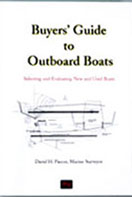New -vs- Used Boats
First time boat buyers are prone toward purchasing new boats.
Their reasoning is usually that they don’t want to “buy into other people’s problems.” Their thinking is that if they buy a new boat, they won’t have any problems. I’ve already explained why this rationale is likely to be erroneous.
Experienced boat buyers have a different philosophy. Theirs is that the first couple years loss in value isn’t worth the price; that if they can buy a late model boat for half or two thirds of the new boat price, they are thousands of dollars ahead, even when the used boat may have problems to be fixed.
For example, consider a boat that sells for $60,000 new and $40,000 two years later. That $20,000 saving could cover a lot of repairs with many thousands left over.
Everybody loves a new product be it a car, house or boat. But you pay dearly for that gleaming new shine that’s going to fade away in a very short time.
The fact is that used boats are tremendously good values. Another important point is that used boats have been tried and tested; new boats haven’t.
The significance of this is that if a boat is going to develop problems, those problems will have become manifest by now and with a survey, you can expect to discover them, if they haven’t been successfully corrected. And if the problems are serious, you don’t buy the boat.
True, with a new boat you have a warranty but the question becomes one of how much is that worth?
If the product doesn’t have a certain degree of quality, a warranty becomes like a Band-Aid over a wound: it covers the wound but doesn’t kill the pain.
It’s trouble enough taking a car back to the dealer for warranty work, but with a boat, this can be a lot more troublesome when the dealer is not located nearby.
With some of the more unpleasant realities of boat ownership out of the way, we’ll now move onto the nuts and bolts of how to evaluate what will be the best boat to fit your needs.
Should You Get a Professional Survey?
This book intended to help you make a reasonably informed inspection of any boat you propose to buy, new or used. It cannot, however, provide you with the years of training and experience that a marine surveyor has.
This book was written because the cost of professional surveys for smaller boats is sufficiently high that most outboard boat buyers will not pay the price of a professional.
Moreover, highly qualified surveyors exist, for the most part, only in the largest boating centers where it is possible for them to earn a living. Surveyors are not to be found in most inland regions, excepting the Great Lakes.
Even so, when spending a sizable portion of your income on a boat, and when in doubt about your own abilities to size up a boat, I’d certainly recommend that you hire a surveyor if one is available.
So there you have it: some tough talk about the realities of boat ownership.
In this chapter I’ve discussed mostly the negatives and bad things that can happen without mentioning the potential good times.
However, I will trust that the various advertising agencies and marketing departments have already done a commendable and better job of that than I could.
Now, if you still think you really want to buy a boat, we’ll get on with the nuts and bolts of how to go about sizing up those thousands of boats to choose from.
- End of Chapter One -
HOME > Buyers' Guide to Outboard Boats >


